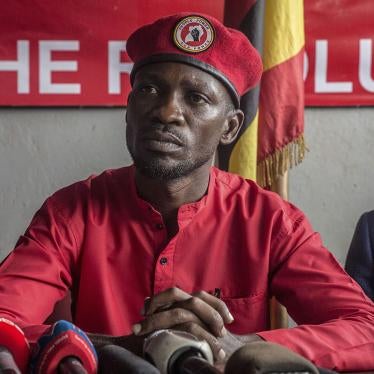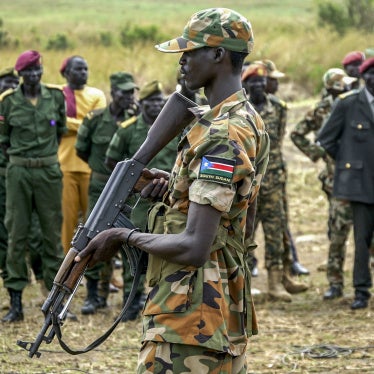Human Rights Watch has been actively engaged with the situation in Burundi, having monitored both human rights developments and arms flows to parties to the tragic civil war in that country in the past two years. On the basis of our research, and continuing investigations in the region, we have called repeatedly on the United Nations Security Council to impose an arms embargo on Burundi (all sides)— in keeping with our policy of advocating curbs on the flow of weapons to forces, be they governments or non-state actors, that commit gross violations of human rights and international humanitarian law.
Although the situation in Burundi appears to have stabilized to some extent and peace negotiations are underway, we remain highly concerned about ongoing violations of human rights and international humanitarian law in Burundi, as well as about the fact that both sides continue to arm themselves at an alarming pace (despite the regional sanctions against the government of President Pierre Buyoya). We are also concerned about the growing role of Burundian government as well as rebel forces in the war in the Democratic Republic of Congo.
We understand that the issue of sanctions will be high on the agenda for the regional summit that is scheduled to be held in Arusha this Saturday, January 23. We also understand that one likely outcome of this meeting is that sanctions on Burundi will be suspended, if not lifted altogether.
Were this to happen, I would ask you to impress on the leaders of the states in the region the need to at least maintain an arms embargo on the government of Burundi, and extend such an embargo to the rebels as well. The advantage of an arms embargo over a blanket embargo of goods is that an arms ban is a highly discriminating mechanism that targets only those who are using (or really: mis-using) weapons, not the civilian population. Moreover, while an arms embargo is only as effective as its implementation by the states imposing it, the imposition of a ban on the provision of arms nevertheless sends a powerful message to those who commit gross violations of human rights that they cannot continue to conduct business as usual.
Such an embargo should cover both the government of Burundi and the armed rebel movements, as both sides have committed gross violations of human rights and international humanitarian law. Human Rights Watch published a report in 1998, Proxy Targets: Civilians in the War in Burundi, which described the pattern of these abuses.
A regional arms embargo should be implemented and actively enforced by the regional states imposing it. Leaks in the sanctions in force since 1996 have permitted both sides to continue to arm themselves. Unsurprisingly, aware of states' willingness to close their eyes to these supplies and what would be done with these weapons, both sides have made no effort to cease their attacks on the civilian population, one conveniently blaming the other for each atrocity. Thanks to the inflow of arms and ammunition, the Army has undertaken an aggressive recruitment drive. New recruits appear to be well armed with AKM and AK-47 Kalashnikov rifles, and to have plenty of ammunition (last week, all the on-duty soldiers in Bujumbura were seen carrying three clips of ammunition each).
To strengthen an embargo regime, we suggest that the regional states monitor the embargo's implementation by placing well-trained security personnel at key transshipment points in their countries and instructing them to carry out inspections of suspect cargo. Moreover, states imposing the embargo should amend their national laws to criminalize embargo violations, and should actively prosecute those who are found to be trafficking in arms to Burundi.
Beyond a regional arms embargo, I would also ask you to consider calling on the U.N. Security Council to impose an international arms embargo on all sides in the war, as this would address the problem of arms flights from other regions directly into Bujumbura (i.e., without the involvement of the neighboring states). It is our understanding that members of the Security Council would endorse the idea of an international embargo on both sides in the civil war if regional states were to show strong support for it. Should the Security Council impose an embargo, neighboring states would be in a strong position to request international assistance in monitoring their borders and in obtaining training of customs and police officers.
There have been repeated reports of arms transfers to both the Burundian government and rebel forces in the past year. For example:
- In February 1998, a cargo plane flying from Burgas in Bulgaria to Bujumbura was grounded in Lagos, Nigeria, as it was attempting to refuel. Finding arms aboard, Nigerian authorities briefly detained the plane's crew, as well as a Burundian military officer, Alfred Nkurunziza, then a key aide to President Buyoya and currently Burundi's minister of defense. This particular flight was but one of many arms flights to Bujumbura in the past year.
- Lake Tanganyika was reported to be the main route for arms traffickers supplying Burundian rebel forces in 1998. Many of these weapons originate in South Africa and are transferred to the rebels via Zambia or eastern Congo. The International Commission of Inquiry (Rwanda) charged by the U.N. Security Council with investigating arms trafficking in the Great Lakes region, drew attention to this business in two reports in 1998, as the Burundian rebels' alliance with rebels from Rwanda had, in the commission's view, significantly weakened the international arms embargo in force against the latter.
Human Rights Watch also continues to receive reports of serious violations of human rights in Burundi:
- Both parties to the conflict continue to target civilians, several hundred of whom have been killed in the last few months. In addition, despite the repeated assurances by the government of Burundi that camps for the displaced would be disbanded, tens of thousands continue to be held against their will in such facilities.
Such reports on recent human rights violations and arms supplies underscore the urgency of the need for an arms ban. In closing, therefore, I urge you to consider calling on the neighboring states to impose an arms embargo against both the Burundian government and rebel forces. Only a strong message of that nature can put an end to the culture of impunity that has characterized the civil war while shielding the civilian population from the deleterious effect of wider sanctions.
Wishing you fruitful negotiations in Arusha,
Sincerely,
Joost R. Hiltermann
Executive Director
Arms Division
cc. His Excellency Salim Ahmed Salim, Secretary General of the OAU
His Excellency Kofi Annan, Secretary General of the United Nations
Members of the U.N. Security Council







